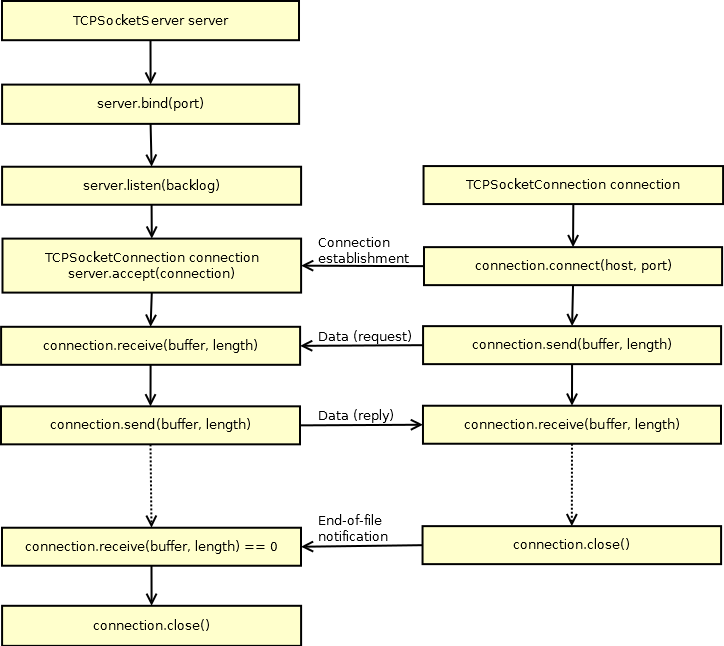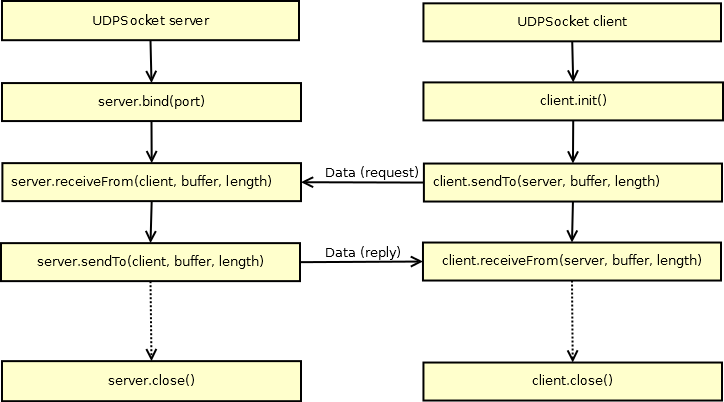Socket
This content relates to a deprecated version of Mbed
Mbed 2 is now deprecated. For the latest version please see the Mbed OS documentation.
For the latest socket API, please see the network socket overview.
Networking
The mbed C++ Socket API provides a simple and consistent way to communicate using bsd-like TCP and UDP sockets over various transports such as ethernet, wifi and mobile networks.
The Socket library is included as part of the networking libraries that implement the different transports, for example:
To use the sockets interfaces, include the appropriate transport library in your program. This page documents the Sockets API they will make available.
There are also various common protocols implemented on top of the sockets libraries to provide higher level APIs such as HTTP Clients; see:
TCP Socket¶

Import library
Public Member Functions |
|
| TCPSocketServer () | |
|
Instantiate a TCP Server.
|
|
| int | bind (int port) |
|
Bind a socket to a specific port.
|
|
| int | listen (int backlog=1) |
|
Start listening for incoming connections.
|
|
| int | accept ( TCPSocketConnection &connection) |
|
Accept a new connection.
|
|
| void | set_blocking (bool blocking, unsigned int timeout=1500) |
|
Set blocking or non-blocking mode of the socket and a timeout on blocking socket operations.
|
|
| int | set_option (int level, int optname, const void *optval, socklen_t optlen) |
|
Set socket options.
|
|
| int | get_option (int level, int optname, void *optval, socklen_t *optlen) |
|
Get socket options.
|
|
| int | close (bool shutdown=true) |
|
Close the socket.
|
|
Import library
Public Member Functions |
|
| TCPSocketConnection () | |
|
TCP socket connection.
|
|
| int | connect (const char *host, const int port) |
|
Connects this TCP socket to the server.
|
|
| bool | is_connected (void) |
|
Check if the socket is connected.
|
|
| int | send (char *data, int length) |
|
Send data to the remote host.
|
|
| int | send_all (char *data, int length) |
|
Send all the data to the remote host.
|
|
| int | receive (char *data, int length) |
|
Receive data from the remote host.
|
|
| int | receive_all (char *data, int length) |
|
Receive all the data from the remote host.
|
|
| void | set_blocking (bool blocking, unsigned int timeout=1500) |
|
Set blocking or non-blocking mode of the socket and a timeout on blocking socket operations.
|
|
| int | set_option (int level, int optname, const void *optval, socklen_t optlen) |
|
Set socket options.
|
|
| int | get_option (int level, int optname, void *optval, socklen_t *optlen) |
|
Get socket options.
|
|
| int | close (bool shutdown=true) |
|
Close the socket.
|
|
| void | reset_address (void) |
|
Reset the address of this endpoint.
|
|
| int | set_address (const char *host, const int port) |
|
Set the address of this endpoint.
|
|
| char * | get_address (void) |
|
Get the IP address of this endpoint.
|
|
| int | get_port (void) |
|
Get the port of this endpoint.
|
|
Friends |
|
| class | TCPSocketServer |
TCP Echo Server¶
Import program
00001 #include "mbed.h" 00002 #include "EthernetInterface.h" 00003 00004 #define ECHO_SERVER_PORT 7 00005 00006 int main (void) { 00007 EthernetInterface eth; 00008 eth.init(); //Use DHCP 00009 eth.connect(); 00010 printf("\nServer IP Address is %s\n", eth.getIPAddress()); 00011 00012 TCPSocketServer server; 00013 server.bind(ECHO_SERVER_PORT); 00014 server.listen(); 00015 00016 while (true) { 00017 printf("\nWait for new connection...\n"); 00018 TCPSocketConnection client; 00019 server.accept(client); 00020 client.set_blocking(false, 1500); // Timeout after (1.5)s 00021 00022 printf("Connection from: %s\n", client.get_address()); 00023 char buffer[256]; 00024 while (true) { 00025 int n = client.receive(buffer, sizeof(buffer)); 00026 if (n <= 0) break; 00027 00028 // print received message to terminal 00029 buffer[n] = '\0'; 00030 printf("Received message from Client :'%s'\n",buffer); 00031 00032 // reverse the message 00033 char temp; 00034 for(int f = 0, l = n-1; f<l; f++,l--){ 00035 temp = buffer[f]; 00036 buffer[f] = buffer[l]; 00037 buffer[l] = temp; 00038 } 00039 00040 // print reversed message to terminal 00041 printf("Sending message to Client: '%s'\n",buffer); 00042 00043 // Echo received message back to client 00044 client.send_all(buffer, n); 00045 if (n <= 0) break; 00046 } 00047 00048 client.close(); 00049 } 00050 } 00051
You can test the above server running on your mbed, with the following Python script running on your PC:
import socket
import signal
import sys
def signal_handler(signal, frame):
print 'You pressed Ctrl+C!'
s.close()
sys.exit(0)
signal.signal(signal.SIGINT, signal_handler)
ECHO_SERVER_ADDRESS = "192.168.2.2"
ECHO_PORT = 7
message = 'Hello, world'
s = socket.socket(socket.AF_INET, socket.SOCK_STREAM)
s.connect((ECHO_SERVER_ADDRESS, ECHO_PORT))
print 'Sending', repr(message)
s.sendall(message)
data = s.recv(1024)
s.close()
print 'Received', repr(data)
TCP Echo Client¶
Import program
00001 #include "mbed.h" 00002 #include "EthernetInterface.h" 00003 00004 const char* ECHO_SERVER_ADDRESS = "192.168.2.2"; 00005 const int ECHO_SERVER_PORT = 7; 00006 00007 int main() { 00008 EthernetInterface eth; 00009 eth.init(); //Use DHCP 00010 eth.connect(); 00011 printf("\nClient IP Address is %s\n", eth.getIPAddress()); 00012 00013 // Connect to Server 00014 TCPSocketConnection socket; 00015 while (socket.connect(ECHO_SERVER_ADDRESS, ECHO_SERVER_PORT) < 0) { 00016 printf("Unable to connect to (%s) on port (%d)\n", ECHO_SERVER_ADDRESS, ECHO_SERVER_PORT); 00017 wait(1); 00018 } 00019 printf("Connected to Server at %s\n",ECHO_SERVER_ADDRESS); 00020 00021 // Send message to server 00022 char hello[] = "Hello World"; 00023 printf("Sending message to Server : '%s' \n",hello); 00024 socket.send_all(hello, sizeof(hello) - 1); 00025 00026 // Receive message from server 00027 char buf[256]; 00028 int n = socket.receive(buf, 256); 00029 buf[n] = '\0'; 00030 printf("Received message from server: '%s'\n", buf); 00031 00032 // Clean up 00033 socket.close(); 00034 eth.disconnect(); 00035 00036 while(true) {} 00037 }
You can test the above Client running on your mbed, with the following Python script running on your PC:
import socket
import signal
import sys
def signal_handler(signal, frame):
print 'You pressed Ctrl+C!'
s.close()
sys.exit(0)
signal.signal(signal.SIGINT, signal_handler)
print 'Server Running at ', socket.gethostbyname(socket.gethostname())
s = socket.socket(socket.AF_INET, socket.SOCK_STREAM)
s.bind(('', 7))
s.listen(1)
while True:
conn, addr = s.accept()
print 'Connected by', addr
while True:
data = conn.recv(1024)
if not data: break
conn.sendall(data)
conn.close()
UDP Socket¶

Import library
Public Member Functions |
|
| UDPSocket () | |
|
Instantiate an UDP
Socket
.
|
|
| int | init (void) |
|
Init the UDP Client
Socket
without binding it to any specific port.
|
|
| int | bind (int port) |
|
Bind a UDP Server
Socket
to a specific port.
|
|
| int | join_multicast_group (const char *address) |
|
Join the multicast group at the given address.
|
|
| int | set_broadcasting (bool broadcast=true) |
|
Set the socket in broadcasting mode.
|
|
| int | sendTo ( Endpoint &remote, char *packet, int length) |
|
Send a packet to a remote endpoint.
|
|
| int | receiveFrom ( Endpoint &remote, char *buffer, int length) |
|
Receive a packet from a remote endpoint.
|
|
| void | set_blocking (bool blocking, unsigned int timeout=1500) |
|
Set blocking or non-blocking mode of the socket and a timeout on blocking socket operations.
|
|
| int | set_option (int level, int optname, const void *optval, socklen_t optlen) |
|
Set socket options.
|
|
| int | get_option (int level, int optname, void *optval, socklen_t *optlen) |
|
Get socket options.
|
|
| int | close (bool shutdown=true) |
|
Close the socket.
|
|
Import library
Public Member Functions |
|
| Endpoint (void) | |
|
IP
Endpoint
(address, port)
|
|
| void | reset_address (void) |
|
Reset the address of this endpoint.
|
|
| int | set_address (const char *host, const int port) |
|
Set the address of this endpoint.
|
|
| char * | get_address (void) |
|
Get the IP address of this endpoint.
|
|
| int | get_port (void) |
|
Get the port of this endpoint.
|
|
Friends |
|
| class | UDPSocket |
UDP Echo Server¶
Import program
00001 #include "mbed.h" 00002 #include "EthernetInterface.h" 00003 00004 #define ECHO_SERVER_PORT 7 00005 00006 int main (void) { 00007 EthernetInterface eth; 00008 eth.init(); //Use DHCP 00009 eth.connect(); 00010 printf("\nServer IP Address is %s\n", eth.getIPAddress()); 00011 00012 UDPSocket server; 00013 server.bind(ECHO_SERVER_PORT); 00014 00015 Endpoint client; 00016 char buffer[256]; 00017 while (true) { 00018 printf("\nWaiting for UDP packet...\n"); 00019 int n = server.receiveFrom(client, buffer, sizeof(buffer)); 00020 buffer[n] = '\0'; 00021 00022 printf("Received packet from: %s\n", client.get_address()); 00023 printf("Packet contents : '%s'\n",buffer); 00024 printf("Sending Packet back to Client\n"); 00025 server.sendTo(client, buffer, n); 00026 } 00027 }
You can test the above Server running on your mbed, with the following Python script running on your PC:
import socket
import signal
import sys
def signal_handler(signal, frame):
print 'You pressed Ctrl+C!'
sock.close()
sys.exit(0)
signal.signal(signal.SIGINT, signal_handler)
ECHO_SERVER_ADDRESS = '10.2.131.195'
ECHO_PORT = 7
sock = socket.socket(socket.AF_INET, socket.SOCK_DGRAM)
sock.sendto("Hello World\n", (ECHO_SERVER_ADDRESS, ECHO_PORT))
response = sock.recv(256)
sock.close()
print response
UDP Echo Client¶
Import program
00001 #include "mbed.h" 00002 #include "EthernetInterface.h" 00003 00004 const char* ECHO_SERVER_ADDRESS = "192.168.2.2"; 00005 const int ECHO_SERVER_PORT = 7; 00006 00007 int main() { 00008 EthernetInterface eth; 00009 eth.init(); //Use DHCP 00010 eth.connect(); 00011 printf("\nClient IP Address is %s \n", eth.getIPAddress()); 00012 00013 UDPSocket sock; 00014 sock.init(); 00015 00016 Endpoint echo_server; 00017 echo_server.set_address(ECHO_SERVER_ADDRESS, ECHO_SERVER_PORT); 00018 00019 char out_buffer[] = "Hello World"; 00020 printf("Sending message '%s' to server (%s)\n",out_buffer,ECHO_SERVER_ADDRESS); 00021 sock.sendTo(echo_server, out_buffer, sizeof(out_buffer)); 00022 00023 char in_buffer[256]; 00024 int n = sock.receiveFrom(echo_server, in_buffer, sizeof(in_buffer)); 00025 00026 in_buffer[n] = '\0'; 00027 printf("Received message from server: '%s'\n", in_buffer); 00028 00029 sock.close(); 00030 00031 eth.disconnect(); 00032 while(1) {} 00033 }
You can test the above Client running on your mbed, with the following Python script running on your PC:
import socket
import signal
import sys
def signal_handler(signal, frame):
print 'You pressed Ctrl+C!'
sock.close()
sys.exit(0)
signal.signal(signal.SIGINT, signal_handler)
ECHO_PORT = 7
print 'Server Running at ', socket.gethostbyname(socket.gethostname())
sock = socket.socket(socket.AF_INET, socket.SOCK_DGRAM)
sock.bind(('', ECHO_PORT))
while True:
print "waiting for UDP data packet..."
data, address = sock.recvfrom(256)
print "Received packet from", address, "with data",data
print "Sending packet back to client"
sock.sendto(data, address)
Blocking/Non-Blocking and Timeout¶
The standard Berkeley sockets functions (accept, send, receive, etc) are blocking, for this reason also our Socket methods are blocking by default.
If you want a non-blocking behaviour, waiting for a certain event only for a certain amount of time, you have to explicitly make a call to the set_blocking(bool blocking, unsigned int timeout) method:
// [Default] Blocking: wait the socket being (readable/writable) forever socket.set_blocking(true) // Non-Blocking: Return after a maximum of (timeout)ms. socket.set_blocking(false, timeout)
Broadcasting¶

Send Broadcast¶
Import program
00001 #include "mbed.h" 00002 #include "EthernetInterface.h" 00003 00004 const int BROADCAST_PORT = 58083; 00005 00006 int main() { 00007 EthernetInterface eth; 00008 eth.init(); //Use DHCP 00009 eth.connect(); 00010 00011 UDPSocket sock; 00012 sock.init(); 00013 sock.set_broadcasting(); 00014 00015 Endpoint broadcast; 00016 broadcast.set_address("255.255.255.255", BROADCAST_PORT); 00017 00018 char out_buffer[] = "very important data"; 00019 00020 while (true) { 00021 printf("Broadcasting...\n"); 00022 sock.sendTo(broadcast, out_buffer, sizeof(out_buffer)); 00023 Thread::wait(1000); 00024 } 00025 }
You can receive the messages sent by the above broadcaster running on your mbed, with the following Python script running on your PC:
import socket
BROADCAST_PORT = 58083
s = socket.socket(socket.AF_INET, socket.SOCK_DGRAM)
s.bind(('0.0.0.0', BROADCAST_PORT))
while True:
print s.recvfrom(256)
Receive Broadcast¶
Import program
00001 #include "mbed.h" 00002 #include "EthernetInterface.h" 00003 00004 const int BROADCAST_PORT = 58083; 00005 00006 int main() { 00007 EthernetInterface eth; 00008 eth.init(); //Use DHCP 00009 eth.connect(); 00010 00011 UDPSocket socket; 00012 socket.bind(BROADCAST_PORT); 00013 socket.set_broadcasting(); 00014 00015 Endpoint broadcaster; 00016 char buffer[256]; 00017 while (true) { 00018 printf("\nWait for packet...\n"); 00019 int n = socket.receiveFrom(broadcaster, buffer, sizeof(buffer)); 00020 buffer[n] = '\0'; 00021 printf("Packet from \"%s\": %s\n", broadcaster.get_address(), buffer); 00022 } 00023 }
To broadcast messages to the above broadcast receiver running on your mbed you can use the following Python script running on your PC:
import socket
from time import sleep, time
BROADCAST_PORT = 58083
s = socket.socket(socket.AF_INET, socket.SOCK_DGRAM)
s.bind(('', 0))
s.setsockopt(socket.SOL_SOCKET, socket.SO_BROADCAST, 1)
while True:
print "Broadcasting..."
data = 'Hello World: ' + repr(time()) + '\n'
s.sendto(data, ('<broadcast>', BROADCAST_PORT))
sleep(1)
Multicasting¶

Send Multicast¶
Import program
00001 #include "mbed.h" 00002 #include "EthernetInterface.h" 00003 00004 const char* MCAST_GRP = "224.1.1.1"; 00005 const int MCAST_PORT = 5007; 00006 00007 int main() { 00008 EthernetInterface eth; 00009 eth.init(); //Use DHCP 00010 eth.connect(); 00011 00012 UDPSocket sock; 00013 sock.init(); 00014 00015 Endpoint multicast_group; 00016 multicast_group.set_address(MCAST_GRP, MCAST_PORT); 00017 00018 char out_buffer[] = "very important data"; 00019 while (true) { 00020 printf("Multicast to group: %s\n", MCAST_GRP); 00021 sock.sendTo(multicast_group, out_buffer, sizeof(out_buffer)); 00022 Thread::wait(1000); 00023 } 00024 }
You can receive the messages sent by the above multicaster running on your mbed, with the following Python script running on your PC:
import socket
import struct
MCAST_GRP = '224.1.1.1'
MCAST_PORT = 5007
sock = socket.socket(socket.AF_INET, socket.SOCK_DGRAM, socket.IPPROTO_UDP)
sock.setsockopt(socket.SOL_SOCKET, socket.SO_REUSEADDR, 1)
sock.bind(('', MCAST_PORT))
mreq = struct.pack("4sl", socket.inet_aton(MCAST_GRP), socket.INADDR_ANY)
sock.setsockopt(socket.IPPROTO_IP, socket.IP_ADD_MEMBERSHIP, mreq)
while True:
print sock.recv(10240)
Receive Multicast¶
Import program
00001 #include "mbed.h" 00002 #include "EthernetInterface.h" 00003 00004 const char* MCAST_GRP = "224.1.1.1"; 00005 const int MCAST_PORT = 5007; 00006 00007 int main() { 00008 EthernetInterface eth; 00009 eth.init(); //Use DHCP 00010 eth.connect(); 00011 00012 UDPSocket server; 00013 server.bind(MCAST_PORT); 00014 if (server.join_multicast_group(MCAST_GRP) != 0) { 00015 printf("Error joining the multicast group\n"); 00016 while (true) {} 00017 } 00018 00019 Endpoint client; 00020 char buffer[256]; 00021 while (true) { 00022 printf("\nWait for packet...\n"); 00023 int n = server.receiveFrom(client, buffer, sizeof(buffer)); 00024 00025 printf("Packet from \"%s\": %s\n", client.get_address(), buffer); 00026 } 00027 }
To multicast messages to the above multicast receiver running on your mbed you can use the following Python script running on your PC:
import socket
from time import sleep, time
MCAST_GRP = '224.1.1.1'
MCAST_PORT = 5007
sock = socket.socket(socket.AF_INET, socket.SOCK_DGRAM, socket.IPPROTO_UDP)
sock.setsockopt(socket.IPPROTO_IP, socket.IP_MULTICAST_TTL, 2)
while True:
print "Multicast to group: %s\n" % MCAST_GRP
data = 'Hello World: ' + repr(time()) + '\n'
sock.sendto(data, (MCAST_GRP, MCAST_PORT))
sleep(1)